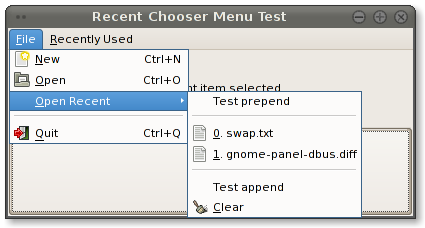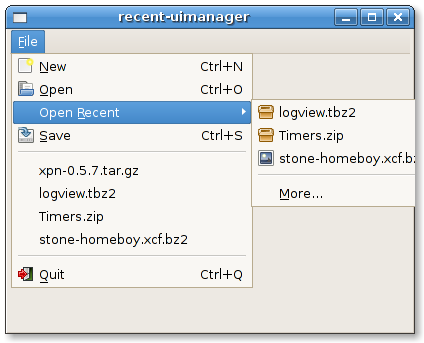Finally, the first development release of GTK+ (codenamed The Magic Project Ridley aka libgnome sucks release by a developer whose name won’t be disclosed in this blog) has been finally sealed by Matthias Clasen yesterday, after battling with make distcheck.
There is so much goodness in this release that I’ll just wait for Kris to make a blog about it, and link the NEWS file and let you see the enormous work that has been done in the past nine months. So, find the contributor nearest to you and hug him (or buy him a beer); to help this hugging (and beer buying) procedure, here’s a list:
Ævar Arnfjörð Bjarmason, Akkana Peck, Alexander Larsson, Alexander Nedotuskov, Alex Graveley, Anders Carlsson, Andrei Yurkevich, Andrew Conkling, Andrew S. Dixon, Arjan van de Ven, Arnaud Charlet, Bastien Nocera, Behdad Esfahbod, Benedikt Meurer, Benjamin Berg, Benjamin Otte, Benoît Carpentier, Bodo-Merle Sandor, Bogdan Nicula, Brad Taylor, Calum Benson, Carlos Garnacho Parro, Carl Worth, Chris Lahey, Chris Lord, Christian Kirbach, Christian Lohmaier, Christian Neumair, Christian Persch, Christian Stimming, Christophe Belle, Claudio Saavedra, Clytie Siddall, Colin Walters, Cory Dodt, Coverity, Crispin Flowerday, Damien Carbery, Damon Chaplin, Daniel Drake, Daniel Kasak, Dan Winship, Dave Andreoli, David Baron, David Trowbridge, Davyd Madeley, Denis Auroux, Dennis Cranston, Diego González, Dom Lachowicz, Donald Straney, Duncan Coutts, Ed Catmur, Elie De Brauwer, Emmanuel Rodriguez, Eric Cazeaux, Evert Verhellen, Francisco Javier F. Serrador, Frederic Croszat, Guilherme de S. Pastore, Guillaume Cottenceau, Gustavo Carneiro, Hamed Malek, Hans Breuer, Havoc Pennington, Hylke van der Schaaf, Ian McDonald, Itai Bar-Haim, Jaap A. Haitsma, James Su, Jean-Yves Lefort, Jens Granseuer, Jeremy Cook, Jody Goldberg, Joe Marcus Clarke, Joe Wreschnig, Johan Dahlin, John Cupitt, John Ehresman, John Finlay, John Palmieri, John Spray, Jonathan Blandford, Jorn Baayen, JP Rosevaar, Jürg Billeter, Kalle Vahlmann, Kathy Fernandez, Kazuki Iwamoto, Kean Johnston, Kjartan Maraas, Kristian Rietveld, Larry Ewing, Leena Gunda, Lillian Angel, Li Yuan, Lorenzo Gil Sanchez, Maciej Katafiasz, Magnus Bergmann, Markku Vire, Mark McLoughlin, Marko Anastasov, Mark Wielaard, Mart Raudsepp, Martyn Russell, Mathias Hasselmann, Matthijs Douze, Maxim Udushlivy, Michael Emmel, Michael Natterer, Milosz Derezynski, Morten Welinder, Murray Cumming, Nickolay V. Shmyrev, Nicolas Setton, Niklas Knutsson, Olexiy Avramchenko, Owen Taylor, Paolo Borelli, Paolo Maggi, Peter Breitenlohner, Peter Harvey, Peter Lund, Peter Zelezny, Philip Langdale, Raphael Slinckx, Ray Strode, Richard Hult, Robert Ögren, Rodney Dawes, Ross Burton, Ryan Lovett, Sadrul Habib Chowdhury, Sebastien Bacher, Søren Sandmann, Stanislav Brabec, Stefan Kost, Stephane Chauveau, Steve Chaplin, Steve Frécinaux, Sven Herzberg, Sven Neumann, Thomas Broyer, Thomas Fitzsimmons, Thomas Klausner, Thomas Leonard, Tim Evans, Tim Janik, Todd Berman, Tommi Komulainen, Torbjörn Andersson, Tor Lillqvist (and his Evil Twin), Torsten Schoenfeld, Tze’ela Hebron, Vincent Untz, Wolfgang Thaller, Wouter Bolsterlee, Yang Hong, Yevgen Muntyan, Yong Wang. And, obviously, our fearless maintainer Matthias Clasen.
Kudos to all of them.


